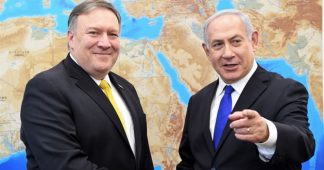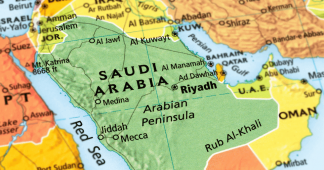No good will come of sending the case to Saudi Arabia,” the former fiancée of the assassinated journalist said. “How do we expect the killers to investigate themselves?”
By Brett Wilkins
Human rights advocates were stunned but not surprised Thursday after a Turkish prosecutor asked a court to move the trial of 26 Saudi men accused of murdering journalist Jamal Khashoggi to Saudi Arabia—whose Crown Prince Mohammed bin Salman is widely believed to have ordered the assassination.
The Washington Post—where Khashoggi worked as a columnist—reports the unnamed prosecutor’s move to halt the trial followed a Saudi transfer request earlier this month, according to Erol Onderoglu, the Turkey representative for the advocacy group Reporters Without Borders.
The defendants—who include a former deputy intelligence chief, a former royal adviser, a member of the royal guard, and intelligence and forensic operatives—are being tried in absentia, as Saudi Arabia refuses to extradite them.
Onderoglu said that if the Turkish Justice Ministry approves the Saudi request, “it will have terrible consequences for the idea of justice.”
Sarah Lee Whitson, executive director of the advocacy group Democracy for the Arab World Now (DAWN), tweeted that it is “no surprise to see Turkey abandon justice” as the country seeks to repair ties with the Saudi monarchy, adding that Turkish Prime Minister Recep Tayyip Erdoğan’s “ballyhoo about the murder was always based on politics, not principle; now it’s been sold for a price.”
And the travesty of justice continues. This time Turkey is betraying #JamalKhashoggi and justice. Nothing surprising though. Turkey is after all one of the worse jailers of journalists and cannot be counted on. SPINELESS though. Spineless. https://t.co/biYRpxSb6a
— Agnes Callamard (@AgnesCallamard) March 31, 2022
Tarik Beyhan, Amnesty International’s Turkey campaign director, said in a statement that “if the prosecutor’s request is granted, then instead of prosecuting and shedding light on a murder that was committed on its territory, Turkey will be knowingly and willingly sending the case to a place where it will be covered up.”
The development comes as Turkey, which is deeply mired in a currency and debt crisis, seeks to repair relations with Saudi Arabia that were seriously damaged by Khashoggi’s assassination.
“Human rights should not be made the subject of political negotiations,” Beyhan said. “A murder cannot be covered up to fix relations.”
Hatice Cengiz, who was engaged to Khashoggi when he disappeared, told the BBC that she was “heartbroken” by the prosecutor’s request.
“No good will come of sending the case to Saudi Arabia,” she said. “We all know the authorities there will do nothing. How do we expect the killers to investigate themselves?”
It is an exemplary situation in terms of showing the dilemma facing humanity in the modern era. Which of the two will we choose? To want to live like a virtuous human being or to build a life by holding material interests above all kinds of values. #justiceforjamal
— Hatice Cengiz / خديجة (@mercan_resifi) March 31, 2022
Khashoggi—whose Post columns criticized Saudi Arabia’s fundamentalist monarchy and called for more openness in the repressive kingdom—was lured to the Saudi consulate in Istanbul, Turkey on October 2, 2018 under the pretext of obtaining documents for his upcoming wedding. Once inside the building, Turkish officials said he was attacked, suffocated to death, and dismembered with a bone saw. One Turkish investigator said Khashoggi was tortured in front the Saudi consul-general and dismembered while he was still alive.
When Saudi officials confirmed Khashoggi’s death inside the Istanbul consulate, they claimed he died in a “fistfight” gone wrong. In 2019, a Saudi court sentenced five people to death and three others to prison terms in connection with Khashoggi’s murder, an outcome that Agnès Callamard—then the United Nations special rapporteur on extrajudicial, summary, or arbitrary killing—called a “mockery” of justice.
Mirroring an earlier assessment by Turkish investigators, the U.S. Central Intelligence Agency (CIA) concluded in November 2018 that bin Salman had ordered Khashoggi’s murder. Turkish media reported at the time that the CIA had a recording of the “smoking gun phone call” in which bin Salman gave the order “to silence Jamal Khashoggi as soon as possible.”
In June 2019, Callamard published a damning 101-page report concluding that the assassination was likely orchestrated by top officials in the Saudi government, including the crown prince. A senior Saudi official reportedly threatened to “take care of” Callamard after she published her report.
Then-U.S. President Donald Trump dismissed the CIA’s findings. He smeared Khashoggi—a permanent U.S. resident—as “an enemy of the state,” while declaring that “our relationship is with the kingdom of Saudi Arabia.”
Trump subsequently vetoed a congressional War Powers resolution that would have ended U.S. complicity in Saudi-led war crimes in Yemen, as well as bipartisan congressional measures to block billions of dollars in arms sales to Saudi Arabia, whose forces along with those of coalition partners including the United Arab Emirates are responsible for the deaths of hundreds of thousands of Yemeni civilians.
Published at www.commondreams.org
We remind our readers that publication of articles on our site does not mean that we agree with what is written. Our policy is to publish anything which we consider of interest, so as to assist our readers in forming their opinions. Sometimes we even publish articles with which we totally disagree, since we believe it is important for our readers to be informed on as wide a spectrum of views as possible.










